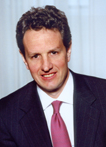Moskow Wins by a Mile
Thursday, January 11, 2007
Fed heads have been out in force this week talking inflation down. In a trend that is sure to continue in the years ahead, the management of inflation "expectations" in an over- liquified world, accomplished through "tough talk" by Federal Reserve members, has become increasingly important.
Vice Chairman Donald Kohn got the week started on a strong note on Monday with 21 mentions of the word "inflation" in his remarks on The Economic Outlook before the Atlanta Rotary Club in Georgia.
This was followed by Michael Moskow of the Chicago Fed on Wednesday who set the bar ridiculously high with 30 mentions of "inflation" in his speech before business journalists in Iowa on the U.S. Economic Outlook.
Earlier today, New York Fed head Timothy Geithner could muster only six mentions during his remarks on Developments in the Global Economy and Implications for the United States. Clearly, Mr. Geithner realized that most of the week's work had already been done the day before and felt that a little "easing" from the Fed was in order.
Highlights from Donald Kohn:
The speech also included these remarkable comments on what caused the housing bubble: So, despite the recent favorable price data, I believe it is still too early to relax our concerns about whether the run-up in price pressures in the spring and summer of last year is truly unwinding and whether it is unwinding rapidly enough to forestall a pickup in inflation expectations.
So, despite the recent favorable price data, I believe it is still too early to relax our concerns about whether the run-up in price pressures in the spring and summer of last year is truly unwinding and whether it is unwinding rapidly enough to forestall a pickup in inflation expectations.
...
Core inflation is still higher than it was just a year ago, and, as I noted, some of the very recent decline may result from one-time changes in relative prices rather than an easing in underlying inflation pressures. A very gradual decline in the trend rate of inflation continues to be the most likely outcome, but that path is still by no means assured, and in my judgment such a decline remains critically important to the sustained prosperity of the U.S. economy.
In sum, conditions appear to be in place for a good year for the U.S. economy, one marked by growth that is moderate and sustainable and by inflation that will be lower than last year's. The economy appears to be weathering the downturn in housing with limited collateral effects, and inflation appears to be easing with the aid of lower energy prices, well-anchored inflation expectations, and competitive labor and product markets.But the current contraction in housing did follow an unusually large run-up in sales and construction and, even more so, in prices relative to the returns on other financial and real assets. Our uncertainty about what pushed home prices and sales to those elevated levels raises questions about how the market will adjust now that expectations of the rate of house price appreciation are being trimmed.
Uncertainty? Low interest rates and lax lending standards were surely the fuel for the current speculative bubble that followed the last speculative bubble that had just run out of fuel.
It probably sounds better to say that you don't know, rather than try to explain it away as the result of Wealth Creation Technology, as did the Chicago Fed not long ago.
Speaking of the Chicago Fed and its head, in addition to 30 mentions of the word "inflation", Michael Moskow threw in two instances of the Fed's most powerful word when it comes to inflation - "vigilance".
Tim Geithner's comments on inflation paled in comparison: By my standards, inflation has been too high. I prefer to see it between 1 and 2 percent. The most recent news on inflation has been good, with the 12-month change in core PCE coming down from 2.4 percent in October to 2.2 percent in November. Looking ahead, core inflation likely will ease somewhat further. The deceleration in economic growth reduces somewhat the risk of sustained pressures from resource constraints. And the recent period of lower oil prices clearly is a positive factor.
By my standards, inflation has been too high. I prefer to see it between 1 and 2 percent. The most recent news on inflation has been good, with the 12-month change in core PCE coming down from 2.4 percent in October to 2.2 percent in November. Looking ahead, core inflation likely will ease somewhat further. The deceleration in economic growth reduces somewhat the risk of sustained pressures from resource constraints. And the recent period of lower oil prices clearly is a positive factor.
Although the recent news has been favorable, risks to the inflation outlook remain. Additional cost shocks at this time would be unwelcome, or we could be wrong about reduced pressures from resource constraints. Long periods of high resource utilization are often associated with rising costs and prices.
...
Another risk to the inflation outlook would be if the recent positive news on inflation turns out to be transitory. Disappointing numbers on actual inflation rates could cause inflation expectations to run too high. If firms and workers expect inflation to be high, they will want to compensate by raising prices and wages or building in plans for automatic increases. In this way, high inflation expectations can lead to persistently high actual inflation.
So the summary on inflation is that the recent price data have been consistent with some easing in core inflation. The key going forward is whether that trend can be sustained and how quickly inflation will move back to the range that is commensurate with price stability. And we need to continue to be vigilant in monitoring the risks to the inflation outlook.
It's almost like he didn't even try. To a significant extent, these financial developments reflect a high degree of confidence in future macroeconomic and financial stability, reinforced by the improvements in inflation performance, growth outcomes and financial resilience of the past several years.
To a significant extent, these financial developments reflect a high degree of confidence in future macroeconomic and financial stability, reinforced by the improvements in inflation performance, growth outcomes and financial resilience of the past several years.
Better monetary policy has lowered expectations of future inflation and inflation volatility and has contributed to lower risk premiums in general. Changes in the cyclical behavior of financial intermediation and credit provision, coupled with the increased stability of the real economy, seem likely to have reinforced the improvements on the monetary policy front.











![[Most Recent Quotes from www.kitco.com]](http://kitconet.com/charts/metals/gold/t24_au_en_usoz_2.gif)
![[Most Recent Quotes from www.kitco.com]](http://kitconet.com/charts/metals/silver/t24_ag_en_usoz_2.gif)
![[Most Recent USD from www.kitco.com]](http://www.weblinks247.com/indexes/idx24_usd_en_2.gif)

3 comments:
Simple: where there's smoke there's fire.
Hah! Those Fedheads are funny the way they talk about inflation like its a monster their taming.
I think most of these second-tier Fed apparatchiks actually might believe that the inflation comes out of nowhere, as opposed to being something totally within their regulatory realm (if not direct control--how can they say these things as M3 soars as a direct result of their own repo operations?!)
I could be a Fed head. All I'd have to do is either lie, be dumb, or be totally ignorant as to how my own organization works. Which would simply be an "easing" from my current condition in all three departments.
I hear they pay well. They print the money, after all.
Post a Comment